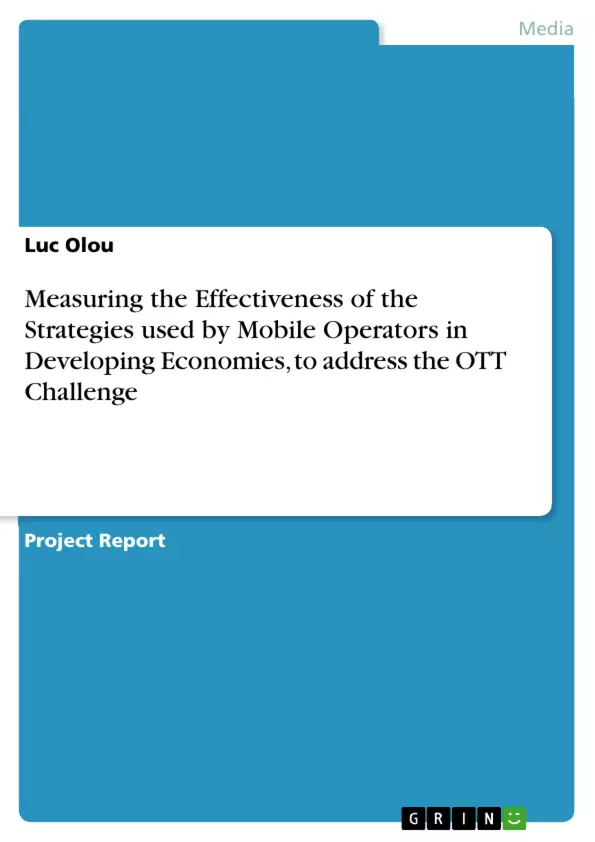Thanks to the advances in telecommunications and mobile computing, smartphones
have emerged as a vital tool for enhanced communication, connectivity and
productivity. With the increased penetration of smartphones and mobile
applications, Over-The-Top (OTT) mobile messaging applications now constitute a
significant threat to mobile network operators’ SMS-messaging revenues. The
literature available today shows that OTT applications like WhatsApp, Viber,
Facebook Chat, Skype, etc will cost $54 billion lost in revenue to mobile network
operators. As a result, it becomes critical for mobile network operators to put in place
effective strategies that will slow the impact of OTT apps.
This research investigates the pro-active measures that mobile operators have taken
in developing countries to address this challenge and also measures the
effectiveness of these measures in their respective markets.
Data was collected through questionnaires from over 400 pre-paid subscribers in
Accra. The findings of the research show that OTT apps are changing the behaviour
of smartphone users regarding text messaging. The research revealed that more
than half smartphone users send less than 5 SMS messages a day. However, with
the introduction of “bundles” by mobile operators in Ghana as a strategy to generate
a sustainable average revenue per user seems to be working. Majority of
subscribers perceive data bundle as a cheaper and better option than Pay-As-You-
Go. However, the introduction of SMS bundle seems not to be an efficient strategy
against OTT apps since they are limited to on-net communications only.
Table of Contents
- Introduction
- Background of the study
- Current situation of the Ghanaian mobile telecommunication industry
Objectives and Key Themes
This research investigates the proactive measures taken by mobile operators in developing countries to address the challenge posed by Over-The-Top (OTT) messaging applications, which significantly impact SMS revenue. The study aims to measure the effectiveness of these strategies in their respective markets.
- Impact of OTT apps on SMS revenue for mobile operators
- Strategies employed by mobile operators to mitigate the OTT challenge
- Effectiveness of these strategies in a developing country context (Ghana)
- User behavior changes in response to OTT apps and operator strategies
- Analysis of pricing models (bundles) and their impact on user choices
Chapter Summaries
Introduction: This introductory chapter establishes the context of the research by highlighting the global proliferation of smartphones and OTT applications, their impact on mobile operators' SMS revenue, and the need for effective counter-strategies. It specifically focuses on the situation in developing countries, using Ghana as a case study, detailing the market share of various mobile operators and emphasizing the rapidly growing smartphone penetration rate in Africa. The chapter lays the groundwork for investigating how mobile operators in Ghana are responding to the challenges posed by OTT apps and the effectiveness of their response.
Keywords
Over-the-top (OTT) applications, mobile network operators, SMS revenue, developing economies, Ghana, mobile messaging, data bundles, pricing strategies, user behavior, smartphone penetration, competitive advantage.
Ghanaian Mobile Telecommunication Industry: Impact of OTT Messaging Applications - FAQ
What is the main focus of this research?
This research investigates the proactive measures taken by mobile operators in developing countries, specifically Ghana, to address the challenges posed by Over-The-Top (OTT) messaging applications on their SMS revenue. It aims to measure the effectiveness of these strategies.
What are the key themes explored in this study?
The study explores the impact of OTT apps on SMS revenue, the strategies employed by mobile operators to mitigate this impact, the effectiveness of these strategies in Ghana, user behavior changes in response to OTT apps and operator strategies, and the analysis of pricing models (bundles) and their impact on user choices.
What is the scope of the study in terms of geographical location?
The study focuses on the Ghanaian mobile telecommunication industry as a case study of a developing country.
What are the key challenges addressed in the research?
The primary challenge is the decline in SMS revenue for mobile operators due to the rise of OTT messaging applications like WhatsApp and Messenger. The research explores how operators are attempting to counteract this trend.
What kind of strategies are examined in this research?
The research examines various strategies employed by mobile operators to compete with OTT apps, including but not limited to pricing strategies (data bundles) and potentially others.
How does the study measure the effectiveness of these strategies?
The study aims to measure the effectiveness of the strategies by analyzing their impact on SMS revenue, user behavior, and market share. The specific methodologies used are not detailed in this preview.
What is the significance of studying the Ghanaian mobile telecommunication market?
Ghana serves as a representative case study of a developing country experiencing rapid smartphone penetration and the subsequent impact of OTT applications on the mobile telecommunications sector. Findings are likely to be applicable to similar markets.
What are the key words associated with this research?
Over-the-top (OTT) applications, mobile network operators, SMS revenue, developing economies, Ghana, mobile messaging, data bundles, pricing strategies, user behavior, smartphone penetration, competitive advantage.
What information is included in the "Chapter Summaries" section?
The provided preview only includes a summary of the introductory chapter, which sets the context by discussing the global proliferation of smartphones and OTT apps, their impact on SMS revenue, and the specific situation in Ghana, including market shares and smartphone penetration rates.
Where can I find more detailed information about the methodology and results?
This document is a preview and does not contain the full research findings. To access the complete research, consult the full publication.
- Quote paper
- Luc Olou (Author), 2014, Measuring the Effectiveness of the Strategies used by Mobile Operators in Developing Economies, to address the OTT Challenge, Munich, GRIN Verlag, https://www.grin.com/document/288279



